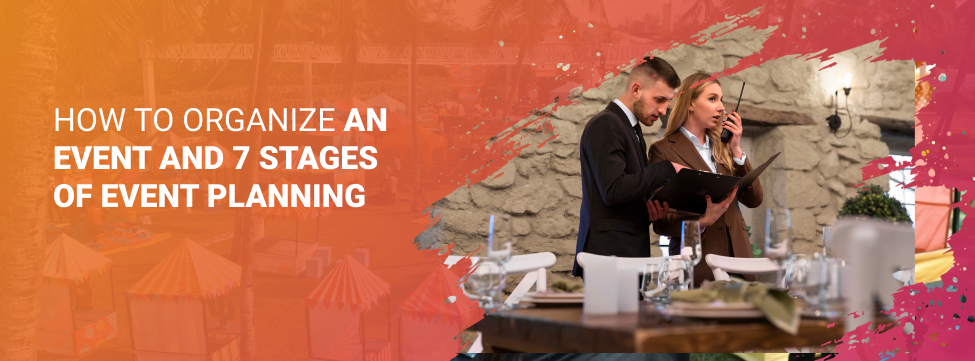
How to Organize an Event and 7 Stages of Event Planning
Event planning is not only about choosing a date and booking a venue but also about creating a memorable experience that resonates with visitors, helps achieve business goals, and runs smoothly. Are you wondering how to organise an event? A structured event needs strategic thinking, the right execution, and close attention to detail at every step of the event planning process. From specifying your motives to the final day, all steps have an important role to play in making an event interactive and successful. Whether you plan an event for your product launch, theme night, family day, conference, awards night, annual days, or team building and employee engagement, a well-thought-out organising process is the key to a successful event.
Searching for advice on how to organise an event? You are at the right place. This comprehensive guide will unveil how to plan an event and the 7 planning stages. So, buckle up, and let’s explore the ins and outs of organising an event!
How to Organize an Event: 7 Event Planning Stages
Successful events result from well-thought-out and efficient planning. Event organisation includes several planning stages, which serve as the building blocks to guide event arrangement. From setting your goals to proper execution and management, the stages ensure that all aspects of events are meticulously thought about. So, what are the 7 stages of event planning? Here’s a quick and simplified breakdown of the 7 stages of successful event planning:
Step 1: Specify the Goals and Objectives of Your Event
The foremost step of planning an event is to clearly specify your motive for arranging a specific event. Motives are outcomes you wish to gain from the event. When you clearly specify your goals and objectives, you give a purpose and direction behind your action. Defining your motives properly before your event will give you a clear picture of your aim. Set your goal with the help of the SMART framework (Specific, Measurable, Attainable, Relevant, and Time-Bound). Defining goals and objectives is important when considering what are the 7 stages of event planning.
Step 2: Organise Your Team
Now that you have set your motives towards planning the event, the next step is to build the team. Build a team to cover event planning steps. A well-coordinated team can properly take care of all the important tasks and ensure everything functions seamlessly. Assigning roles to your team members to avoid confusion will help you proceed quickly and maintain accountability within the team. Regularly meet and communicate with your team members, and use their unique skills for proper planning and execution.
Step 3: Set a Budget
A well-thought-out budget is crucial to avoid overspending. It is among the most crucial event planning steps. A detailed budget helps you allot resources and prepare yourself for sudden expenses. You can estimate how much amount of money you can spend on the event and the things you need to rent or purchase such as decorations, food, booking the venue, making seating arrangements, etc. Budgeting helps you keep everything on the right track. With careful budgeting, you can ensure that the event is enjoyable and unforgettable without much stress on finances. Hence, it is like a financial roadmap for a successful event.
Step 4: Choose a Venue and Date
Booking a venue and date are among the critical steps to organise an event. Choosing the right venue sets the platform for a successful event. When searching for the perfect venue, consider factors such as size, accessibility, and suitability to your theme. While confirming the venue, negotiate rental terms, ensure required permissions, and confirm dates. Once you book the venue, you can move forward with other aspects, which include decoration, logistics, and catering.
Step 5: Plan Event Details
Planning small details in advance is among the most essential event planning steps to ensure everything runs seamlessly. Paying attention to small details will substantially contribute to the event’s success. Coordinating closely with vendors and suppliers is necessary to ensure the quality and timely delivery of products and services. You can also craft a detailed schedule to track everything and organise the necessary activities efficiently. Also, ensure all technical aspects like interconnection and AV equipment are working perfectly well and have on-site assistance in the case of any malfunctions.
Step 6: Marketing and Promotion
Now that you have built a team, finalised a date, and booked the venue, one of the essential steps to organise an event is to let individuals outside your organisation know about the event. Marketing and promotion are all about finding the right audience. You can promote your event through email campaigns, social media, content marketing, paid advertisements, collaborations with industry leaders, and early discounts to attract more registrations. Nowadays, social media marketing is highly popular for connecting and engaging with audiences. Overall, marketing and promotion help you spread news about your event and persuade individuals to attend it.
Step 7: Execute Your Plans and Supervise Your Event
This is the last but one of the most crucial steps to organise an event. It is time to enjoy the fruit of your efforts and witness the event come to life. On the event day, stay flexible and keep yourself prepared in case of any challenges. Impactful execution includes managing the setup, cooperating with the team, and tackling sudden issues. This is where your advanced preparation is valuable and ensures everything goes as planned. As the event occurs, note what is running smoothly. These details can help you for future events.
How to Organize an Event: Tips to Follow
Here are some points that you should follow to plan an event:
Plan Your Event Early
Big events need some months of planning, so planning early ensures that your team has sufficient time to organise the event. Even if you plan a small event, detailed planning is required to ensure everything goes on as planned. So, whether you want to host a large or small event, start planning early.
Be Flexible in Your Decisions
Some plans may need adjustments because of unexpected circumstances such as weather, scheduling challenges, sickness, date issues, location problems, etc. Being flexible ensures that you can make changes in your plans.
Craft a Planned Document
Craft an accessible shared document with all the necessary details to ensure that your team members are aware and prepared for any modifications or updates regarding event matters.
Planning an event for your team ?
Conclusion
So, that’s all about how to organise an event. Planning an event is a strategic procedure that needs thorough execution. Complying with a structured management approach ensures smooth arrangement, most engagement, and measurable effect. By making the most of the correct tools and strategies, you can create memorable experiences that foster growth and active participation from the audience. Are you thinking of hosting an event for your employees? Reach out to Dream Events and Services. We are the leading Corporate event management company in Bangalore, with expertise in corporate events. Contact us today and plan an unforgettable event!
